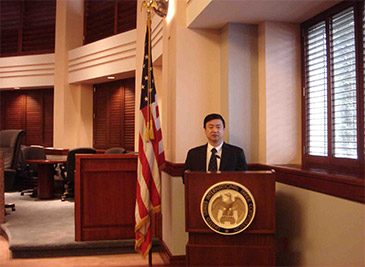According to U.S. law, only a licensed U.S. attorney or law firm may represent and defend an enterprise in the ITC. In order to ensure an absolute victory in the ITC investigation, JK recruited a 9 member law team comprising senior lawyers in the most renowned law firms within the intellectual property field with the Fish & Richardson law firm specialized in patent law as the main defense attorneys. JK also received the most reliable chemical specialist in the U.S. as the expert witness. In July 2007, JK submitted its application for participation in the ITC-337-TA-604 investigation of all the five sucralose patents. The lawyers of Tate & Lyle tried their best to object the application of JK, because the participation of JK not only disrupted the strategic plan of Tate & Lyle, but also cost the lawyers of Tate & Lyle even more time and expenses. Furthermore, Tate & Lyle did not have any prepared evidence and legal plan for JK as it was caught by surprise, further increasing its likelihood to lose the case. JK presented the following arguments pursuant to the law of ITC: (I) products of JK had already been exported to the U.S. market; (II) there existed clients and prospective clients of JK in the U.S. market; (III) the three accused enterprises could not represent the interests of JK due to their divergent production methods; (IV) the application for general exclusion order by Tate & Lyle had already seriously harmed the market interests of JK; and (V) JK could complete the evidentiary presentation and defense pursuant to the statutory procedures of the ITC and thus had no problem catching up in the legal proceedings. Thanks to the active defense by the defense attorneys of JK, on 15 August, 2007, the judge and commissioner of ITC agreed that JK could participate in the ITC-337-TA-604 investigation in connection with the sucralose products on its own accord. Thus JK became the first Chinese production enterprise that applied for participation the ITC investigation on its own initiative. In addition, JK made a statement to the world on the renowned American website FLEXNEWS that JK Sucralose fully respects the intellectual property rights of other entities, and expects that others should in return, respect the intellectual property rights of JK.

According to the procedural requirements of ITC, all the materials (including materials stored in the computer, text materials and mails) of JK must be submitted to the lawyers of Tate & Lyle. As per the requirements, JK sent thousands of pieces of materials reviewed by its Chinese attorneys to its American defense attorneys, and after the careful selection, said materials were sent to the lawyers of Tate & Lyle in accordance with the procedural requirements. The number and budget of the lawyers of Tate & Lyle were increased due to the participation of JK. According to the procedural requirements, Tate & Lyle must complete the investigation of JK within the statutory period. Based on the materials submitted by JK, Tate & Lyle cross-examined one company witness and three technical witnesses of JK for around three days (beginning 5 October, 2007) and collected relevant evidence. The persons present included the American defense attorneys of JK and their Chinese interpreter, lawyers of Tate & Lyle, and officials of the ITC and their Chinese interpreter. Sound recordings and photographs were taken during the whole inquiry and evidence collection process. Based on the materials submitted by JK and the inquiry of witnesses by its lawyers and experts, Tate & Lyle, accompanied by the officials of the ITC and the American attorneys and Chinese interpreters of JK, took pictures and samples of the on-site production process in the factory of JK on October 30, 2007. In order to find implicating evidence, Tate & Lyle even took samples of the dust on the factory floor for laboratory testing, hoping to find evidence unfavorable to JK. All the samples collected by Tate & Lyle were promptly sent to the American laboratory designated by Tate & Lyle through express mail with thermal insulation service. To ensure the accuracy of the test data of the samples, JK also sent the samples to its designated American laboratory through the same means of thermal insulation and refrigeration. In order to secure an absolute victory, the American defense lawyers of JK conducted investigation on the main patent applicants of Tate & Lyle in England pursuant to the statutory procedural requirements, as well as the investigation of the actual use of such patents in the U.S. In addition, the lawyers of JK researched and analyzed numerous documents and materials to prove the invalidity of the patents of Tate & Lyle. According to the statutory procedural requirements of ITC, the company witness, technical witness and expert witness of JK conducted a debate in the court on February 28, 2008, and on the same date, the evidence submission period expired. Video recording and photography were used during the whole aforementioned process.
Based on the evidentiary materials submitted by the two parties and the debate in the court, the third party lawyers of ITC made the same decision before and after the hearing that the production techniques had not infringed upon the patents of Tate & Lyle and the “463” patent of Tate & Lyle was invalid. After receiving sufficient opinions of the two parties during the hearing and comprehensively reviewing the case materials, the administrative judge of ITC decided on September 22, 2008 that (I) the sucralose and the down-stream products of JK thereof imported to the U.S. had not infringed upon the four patents (No. 4980463, 5470969, 5498709 and 7049435) alleged by Tate & Lyle; (II) the ITC had no jurisdiction over the No. 5034551 patent alleged by Tate & Lyle; and (III) there was no domestic industry relating to the No. 4980463 patent. Based on the abovementioned decisions, ITC ruled that except for the absent and losing parties, the production techniques of JK and the three accused Chinese enterprises had not infringed upon the patents of Tate & Lyle.
This investigation also involved the product on which the production of sucralose is based, the precursor sucralose-6-ester. According to the regulation of the ITC, semi-finished products were not subject to the jurisdiction of the ITC because they had not been imported to the U.S.A. However, because the semi-finished product could be only used for the production of sucralose, the ITC judge decided to accept the case in connection with the semi-finished product, which would become a precedent of the ITC since no semi-finished product in history had been subject to the jurisdiction of the ITC. The ITC judge had made 8 decisions to adjourn the trial because the commissioners of the ITC had differing opinions, many patents of the semi-finished product were involved, and there were no sufficient supporting regulations. The trial lasted for nearly 24 months, which was very rare in the history of the ITC.

 En
En CN
CN


